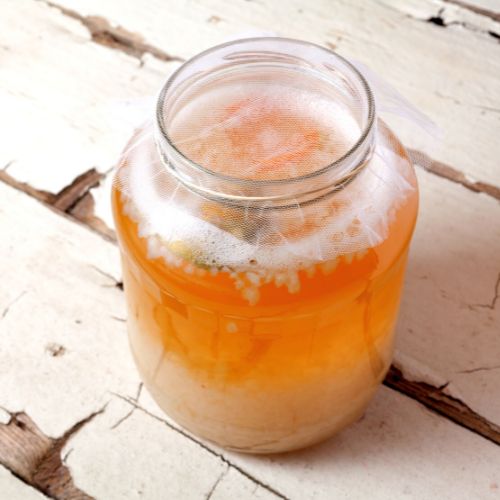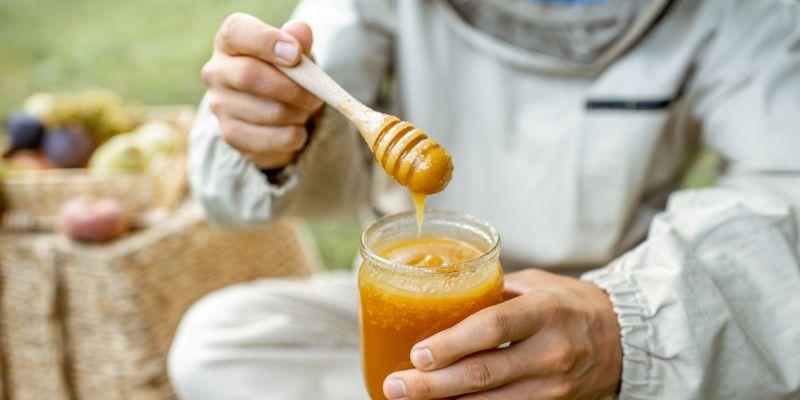Until recently, I didn’t know what fermenting honey was. Fermented honey is made by adding moisture and warmth to raw honey. In fact, it is known for its anti-viral and anti-bacterial properties. It is even supposed to improve your immune system.
Honey is a delicious, natural sweetener that has been used for centuries. It is made by bees from the nectar of flowers and can be used in many different ways. Furthermore, it is a natural preservative and can last for many years if stored properly.
One of the best ways to preserve honey is to ferment it. Not only does fermented honey offer amazing health benefits, it is delicious when combined with other foods during fermentation.
The Health Benefits Of Honey
According to the National Library of Medicine, “Some of the vitamins found in honey include ascorbic acid, pantothenic acid, niacin, and riboflavin; along with minerals such as calcium, copper, iron, magnesium, manganese, phosphorus, potassium, and zinc.”
- Boosting energy levels: Glucose in honey is absorbed by the body and used for energy.
- Improving digestion: The acids in honey help to break down food and improve digestion.
- Reducing inflammation: Known anti-inflammatory properties of honey can help to reduce swelling and pain.
- Healing wounds: The antibacterial properties of honey help to keep wounds clean and prevent infection.
- Soothing coughs: Having a thick and viscous nature, honey coats the throat and soothes coughing.
What Is Fermenting Honey?
Fermenting honey is a process where the sugars in honey are converted into alcohol and acids. It occurs when the natural yeast in honey has enough heat and moisture to cause the sugars to ferment. This means they turn into alcohols and acids which kill off any bacteria or fungus that may be present.
The fermentation of honey can occur naturally or it can be done artificially. However, raw honey often does not contain the moisture content needed for fermenting to occur. This means you usually need to add water!
Fermented honey also has a much longer shelf life than regular honey. In fact, not only does it last longer, the added health benefits are amazing.
The fermentation of honey has been used for centuries as a way to preserve the honey.
It is a better way to preserve honey than other methods such as canning or freezing because it does not change the flavor or texture of the honey.
Fermented honey also has a higher nutritional value than regular honey. The fermentation process breaks down the sugars into smaller molecules that are easier for the body to absorb.

Fermenting Honey Is A Better Way To Preserve It
Traditional home preserving methods like canning or freezing will allow you to store honey for years. However, canning may alter the texture and taste of your honey due to the high heat involved.
Freezing honey will stop crystallization but there will be a loss of moisture due to the process. This will affect how you can use it once thawed.
Below are 11 benefits of fermented honey:
1. Fermenting Honey Kills Any Harmful Bacteria
During the fermentation process, yeast eats up all of the sugars in the honey, leaving behind only alcohol and acids. This eliminates any chance of harmful bacteria surviving as they require sugars as food. Bacteria also don’t usually like acidic environments.
2. Does Not Destroy The Nutritional Value Of The Honey
Canning or freezing honey can destroy some of the vitamins and minerals presen. However, fermenting honey does not destroy these nutrients, making it a more nutritious option. In fact, fermented honey contains additional health benefits which boost immunity.
3. Creates A More Shelf-stable Product
Honey can spoil if not stored properly. In fact, it is recommended to store it in your pantry in an air-tight glass jar. Do not store honey where it may be subject to extremes in temperature, such as the fridge. And, keep it away from any heat-generating appliances.
Fermented honey can last for decades and does not require special storage conditions.
4. Creates Simple Sugars Which Are Easier For The Body To Absorb
When honey is fermenting, the complex sugars are broken into simpler sugars like glucose and fructose. These are easier for the body to absorb.
This makes fermented honey a great way to get calories quickly and easily. Along with its anti-bacterial, anti-viral and immune boosting properties it is a super food if you are unwell.
5. Fermenting Honey Increases Its Antioxidant Activity
Antioxidants are important for fighting free radicals in the body, which can cause cell damage. Free radicals have been linked to a number of diseases, such as cancer.
The fermentation process increases the antioxidant activity of honey, making it a more effective weapon against disease.
6. Fermented Honey Is A Probiotic
Probiotics are live bacteria that are good for gut health. They help to keep the balance of acidity in your gut, which can impact your overall health.
Fermenting honey creates good live bacteria within its culture. It becomes a probiotic food that can improve your gut health.

7. Increases Antioxidant Activity
One of the most important benefits of fermenting honey is that it increases its antioxidant activity. This is because when honey is fermented, there is an increase in the production of flavonoids and polyphenols.
These powerful antioxidants help to protect the body from damage caused by free radicals. To further boost antioxidant power, try fermenting honey with garlic. This is a true superfood!
8. Higher Nutritional Value In Fermented Honey
Another benefit of fermenting honey is that it increases the base nutritional value. This is because, during the fermentation process, polyphenols and flavonoids are produced which are then absorbed by the honey.
So, not only is fermented honey delicious, it is more nutritious and better for your health.
9. Fermenting Honey Increases Anti-Bacterial Activity
Fermented honey has increased antibacterial activity. This is because the fermentation process produces lactic acid, which is a powerful antibacterial agent.
Natural or raw honey has antibacterial properties. However, when you ferment it, the lactic acid kills any bacteria. Use it for wound healing or to treat infections.
10. Better Antiviral Activity
Activate antiviral properties of honey by fermenting. Acetic acid is a powerful antiviral agent and is abundant in fermented honey.
With what the world has dealt with the last few years a natural antiviral is a blessing. By fermenting honey and consuming it regularly, you will be more able to fight a Covid-19 or other virus infection.
11. Anti-Fungal Properties Of Fermenting Honey
Another benefit of fermenting honey is that it increases the anti-fungal activity of the honey. The fermentation process produces propionic acid, which is a powerful anti-fungal agent.
Fermented honey will be more effective at killing fungi and will be better for your health.

Are There Risks With Fermented Honey?
There are no known risks or side effects associated with consuming fermented honey. However, if you are allergic to pollen, you should not consume fermented honey.
In fact, with a pollen allergy, you will not be able to have any honey products, unless they have been heat treated.
If you are pregnant or breastfeeding, the expert advice is to not consume fermented honey. This is because the fermentation process can increase the amount of yeast in the honey.
Conclusion
Fermenting honey is the best way to preserve it and bring out many health benefits. It is important to note that there are no known risks or side effects associated with consuming fermented honey.
However, if you are allergic to pollen or are pregnant or breastfeeding, you should not consume fermented honey.


 Hi! I’m Sally-Anne!
Hi! I’m Sally-Anne!